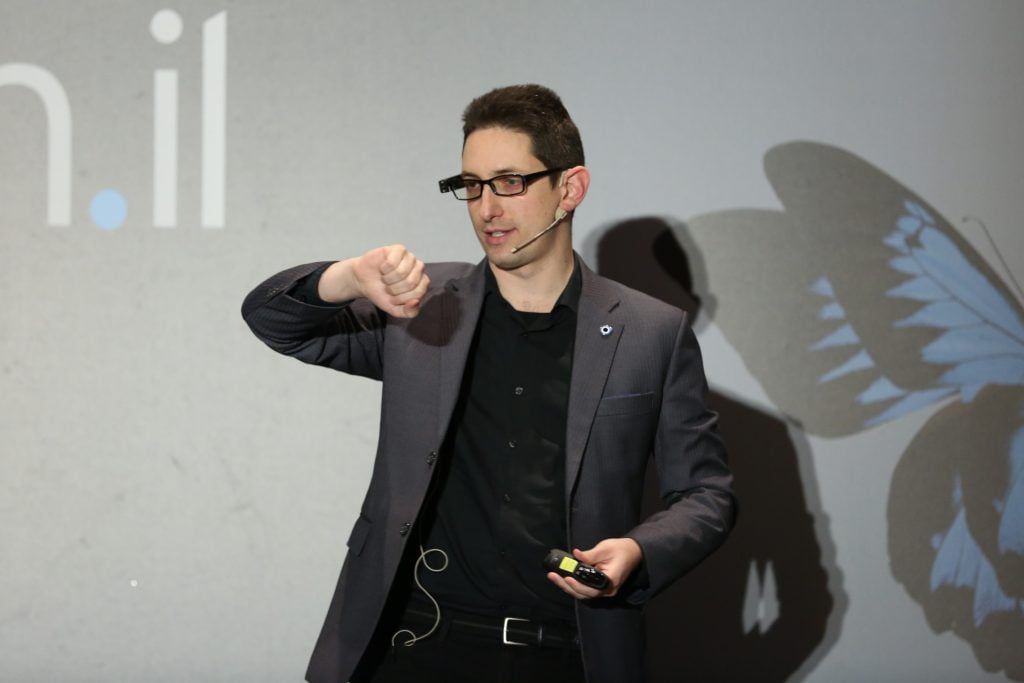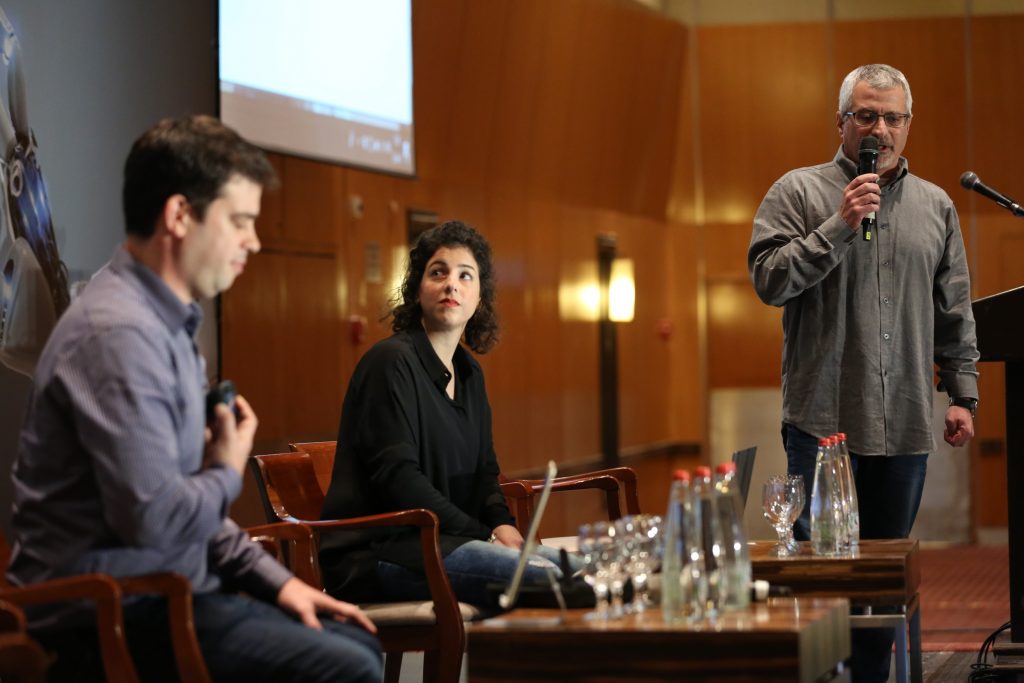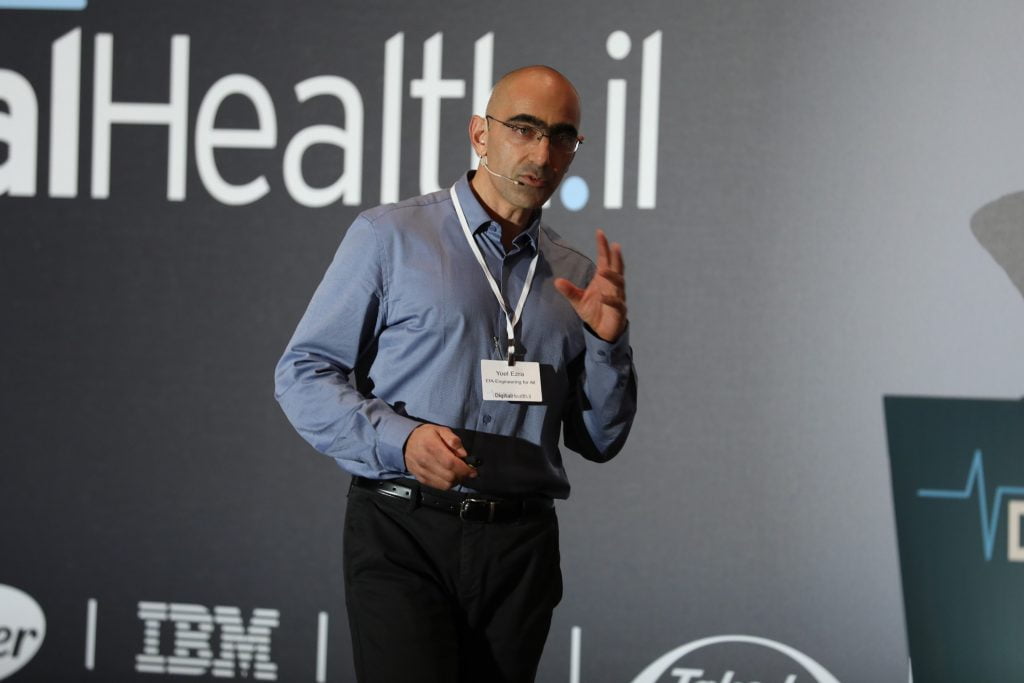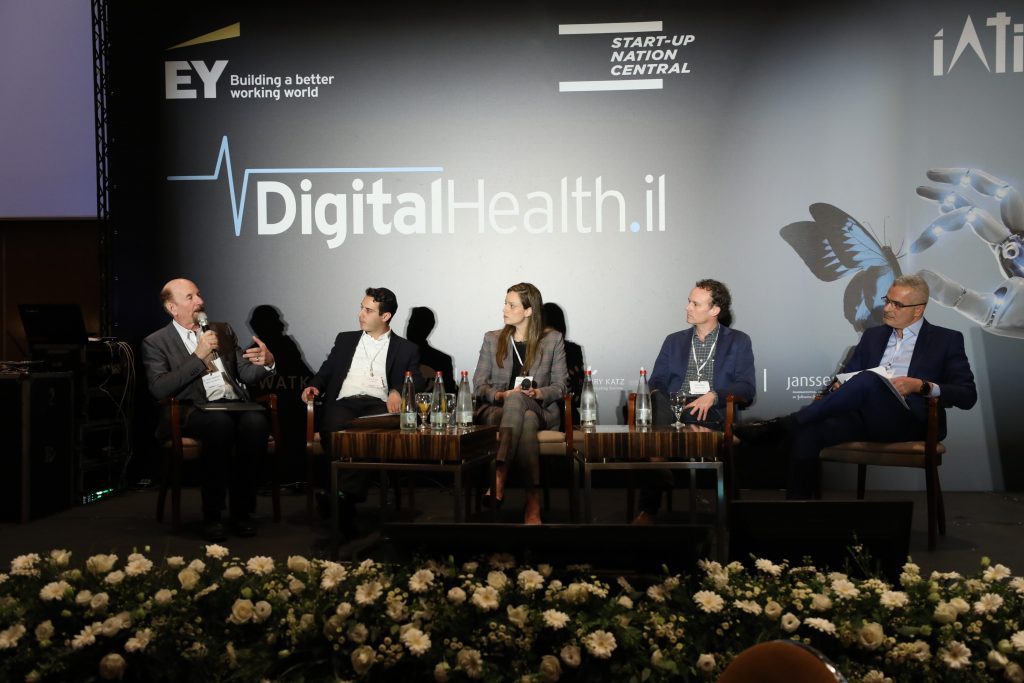Imagine a world where you can undergo a medical checkup in the privacy of your home without the physical presence of a doctor, where an Amazon Echo is a standard medical device, and where physicians can get accurate diagnoses by plugging data into sophisticated digital systems.
According to many of the speakers at a health conference in Tel Aviv on Tuesday, this is the world we are headed for in just a few short years. Artificial intelligence (AI), data storage and sharing, Blockchain technology, telehealth, and other health-related technologies are advancing so quickly that they are now categorized under the name “exponential technology,” according to the experts at the annual Digital Health IL event which brings together biotech startups, entrepreneurs, investors and leading players in the global digital health landscape.
SEE ALSO: World Health Day: Israel Ranked 9th Healthiest Country
The conference came just before Israeli Prime Minister Benjamin Netanyahu announced on Thursday at the World Economic Forum Annual Meeting in Davos, Switzerland that Israel would soon be embarking on a 1 billion shekel (roughly $300 million) project aimed at disrupting the health sector in the country. Netanyahu said Israel would be teaming up with multinational software company SAP over the next five years for a program designed to develop personalized and preventive medicine, with the use of AI and machine learning tools for more tailored diagnoses and treatment. The proposal is set to come before cabinet approval and the research for the project will be done exclusively in Israel, a world leader and innovator in health technologies.
Some of the Israeli technologies already transforming the health industry and blazing new trails were on display on Tuesday at the Tel Aviv conference, hosted by EY Israel, Start-Up Nation Central and the Israel Advanced Technology Industries (IATI).
Israeli tech company OrCam, for example, whose founders Prof. Amon Shashua and Ziv Aviram brought us Mobileye, the hugely successful startup developing cutting-edge autonomous driving technologies, and which was acquired by Intel for over $15 billion, showcased its new device MyEye 2.0. The device, for the blind and visually impaired, takes the power of artificial vision and incorporates the advanced technology into a wearable product that can read out texts and recognize people and common objects. OrCam was recently featured in NoCamels as one of nine Israeli “superhero” companies changing the world.

Eliav Rodman is not wearing a watch, but the OrCam MyEye attached to his glasses recognizes his wrist and tells him the time, At the Digital Health IL conference in Tel Aviv on January 23, 2018. Photo by Shauli Landner
Also on display was a new line of FDA-compliant products developed by Tytocare, an Israeli company specializing in telehealth, to conduct remote doctors’ visits. TytoCare COO Ofer Tzadik showed the audience how, using an electronic Tyto stethoscope, for example, a patient may record his/her heart rate, send it to a health organization through a secure Amazon cloud service, and receive feedback from a physician. Alternatively, one can perform a full physical with TytoCare products while connecting through video to a doctor in real-time. Tzadik says that some doctors even report that TytoCare products give readings that are more high quality than the equipment physicians use in conventional medical checkups.
One of the event’s highlights was a startup contest in which six early-stage companies showed off their innovative products.

Ofer Tzadik (right) explains as his assistant (left) demonstrates use of a TytoCare stethoscope. Photo by Shauli Landner
Finalists included Duality, a consulting firm that mediates between researchers and data owners to give the former access to the latter; Magnetiq, a company with a product that can make colonoscopies more productive; Orca Dental AI, with a product that assists dentists in data analytics; OvuCon, with a more accurate home-use ovulation predictor; and Verified Planet, which makes smart lab containers to avoid mix-ups of lab samples, including in-vitro fertilized human embryos.
But the winning startup was EfA (short for “engineering for all”), a company that makes healthcare more available to people who live in areas with less access to healthcare. Its product, RevDx, is a portable device that can perform automated blood tests, diagnostics, and data analytics on the spot, a kind of hand-held hospital to assist under-equipped medical workers. CEO Yoel Ezra and his team hope to bring this product to less developed regions in Africa, Asia, and elsewhere, with the motto “Where you live shouldn’t determine whether you live.”

Yoel Ezra presenting EfA, the startup contest winner at the DigitalHealth.il Conference in Tel Aviv on January 23, 2018. Photo by Shauli Landner
AI’s effect on healthcare
One of the key topics covered at the conference was the use of AI in the healthcare industry and some of the main concerns. On a panel discussion, Facebook Israel’s head of digital health, Noam Gabison, and the chief clinical transformation officer for the Louisiana-based Ochsner Health System, Dr. Richard V. Milani, pondered how AI would cause us to be viewed more as “consumers” than “patients,” as people become increasingly able to “self-diagnose” through internet searches or one of the many health products flooding the market. Indeed, one panelist said that 60 percent of people who go to doctors today first self-diagnose and then approach medical professionals for a “second opinion.”
Meanwhile, robot health workers, said assistant medical director at California-based healthcare consortium Kaiser Permanente, will soon be a common sight. Already, chatbots (think, Amazon Echo) are making their way into clinics, said John Mattison. Milani pointed out that people often feel more comfortable confiding important medical information to the Echo’s Alexa than to a doctor or nurse and noted that patients at chemo-clinics can develop emotional connections with chatbots.
Sign up for our free weekly newsletter
SubscribeAutomation is also a notable trend as doctors are increasingly making use of automation technologies to increase efficiency. Dr. Erez Shalom, a project consultant and researcher at Ben-Gurion University of the Negev, showed in a study with his colleagues that over two-thirds of doctors’ decisions are “redundant,” though “correct,” and that the use of a “decision support system” to automate data analysis brought the redundancy rate down to 3 percent.
Blockchain technology
Blockchain has become quite the buzzword in 2017-2018, though the technology has been around for about a decade. The premise of the tech is a decentralized system that manages data via “blocks” that oversee modifications made to this data. The idea originally comes from the bitcoin public ledger, established in 2008, which records all bitcoin transactions to discourage fraud. Nowadays, entrepreneurs are thinking how to apply this concept to anti-corruption, confidence-building, and efficiency-heightening efforts in all sectors, including health.
Hashed Health, a consortium of healthcare companies based in Tenessee, and ProofWork, an Israeli startup, are two companies promoting blockchain education and implementation in healthcare, and whose founders spoke at the conference.

From left to right: John Mattison, David Suter, Shelly Hod Moyal, John Bass, and panel moderator Eyal Ben-Yaakov discuss Blockchain. Photo by Shauli Landner
Hashed Health’s John Bass claims that blockchain’s decentralized nature helps avoid “rent-seeking behavior” and helps garner “patient consent” through its transparency. David Suter, co-founder of ProofWork, said that the amount of money lost to inefficiency in healthcare is in the trillions and that blockchain can help solve the problem by encouraging proper practices. At the same time, he stated it was too early to fully implement blockchain and that the focus should be first to educate people about what it is and how it works.
Blockchain also has its skeptics. Mattison warned that decentralization can be a source of inefficiency itself and urged blockchain only as a last resort where a central authority absolutely cannot be trusted to handle certain data. He also suggested it was realistic to think data owners would willingly form the “consortiums” necessary for blockchain to work well.
Shelly Hod Moyal, founding partner of iAngels, a crowdfunded investment firm for early startups, said that blockchain is a “nice idea” and might work in certain contexts, but is not scalable.
Data Storage and Sharing
Big Data has become an integral part of digital health – remote health visits utilize cloud storage, companies are trying to make data more available for researchers, and blockchain is all about managing data. The medical data now stored on these clouds and blockchains are notoriously sensitive and privacy is a top concern.
SEE ALSO: Israeli Brain Monitor Startup Wins Henry Ford Health System AI Challenge
Dr. Deborah Kilpatrick, CEO of the California-based Evidation Health, noted that recent debates on health data have centered on who should have access to a patient’s genome, a set of genes particular to one person. Today, Kilpatrick said, this debate is shifting rapidly from genome to “behaviorome,” data on a particular individual’s regular behaviors.
The prevailing sentiment among the speakers was that largest owners of this data by far are none other than Facebook and Google, and these companies will most likely play an increasingly larger role in managing health data going forward.
Related posts

Editors’ & Readers’ Choice: 10 Favorite NoCamels Articles

Forward Facing: What Does The Future Hold For Israeli High-Tech?

Impact Innovation: Israeli Startups That Could Shape Our Future




Facebook comments